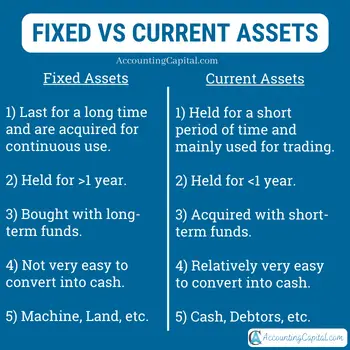Fixed Assets Vs Current Assets
| Basis | Fixed Assets | Current Assets |
| Definition | Fixed assets are assets that last for a long time and are acquired for continuous use by an entity. | They are resources held for a short period of time and are mainly used for trading purposes. |
| Timeframe | The assets of this type are held for a long period of time. (>1 year) | The assets of this type are held for a short period of time. (<1 year) |
| Purpose | The purpose to spend on fixed assets is to generate income over the long term. | Their purpose is to manage day-to-day trading activities over the short term. |
| Valuation | A fixed asset is valued by (the cost of the asset – depreciation). | A current asset is valued as per its current market value or cost value, whichever is lower. |
| Funding Source | Fixed assets are acquired with long-term funds. | Current assets are acquired with short-term funds. |
| Sale | At the time of sale, there is a capital gain or capital loss. | At the time of sale, there is an operating gain or operating loss. |
| Collateral | They can be used as collateral. | They can not be used as collateral. |
Fixed Assets
1. Also called long-term assets, fixed assets are held by a business with the intention of continuous use and not to be resold in a short period of time.
2. Fixed assets would usually last for more than a year or 1 complete accounting cycle of a business.
3. They are bought from long-term funds deployed within a business.
4. These assets are used to keep a business running and earn profits out of operations.
5. If and when required, fixed assets are not easy to convert into cash.
6. Examples of fixed assets include Machinery, Building, Furniture etc.
Related Topic – What is Chart of Accounts?

Current Assets
1. On the contrary, current assets are kept for resale, and can be converted into cash or an equivalent in a short period of time.
2. Current assets are likely to be realized within a year or 1 complete accounting cycle of a business.
3. They are bought out of short-term funds deployed within a business.
4. These are assets which are converted to cash or exhausted during the regular accounting cycle of a business.
5. Current assets are easy to liquidate as compared to fixed assets.
6. Examples of current assets include Cash in hand, Cash at the bank, Stock, Debtors etc.
Short Quiz for Self-Evaluation
Revision & Highlights Short Video
Highly Recommended!!
Do not miss our 1-minute revision video. This will help you quickly revise and memorize the topic forever. Try it :)
>Related Long Quiz for Practice Quiz 20 – Current Assets
>Related Long Quiz for Practice Quiz 35 – Fixed Assets
>Read Difference between Current Assets and Current Liabilities
